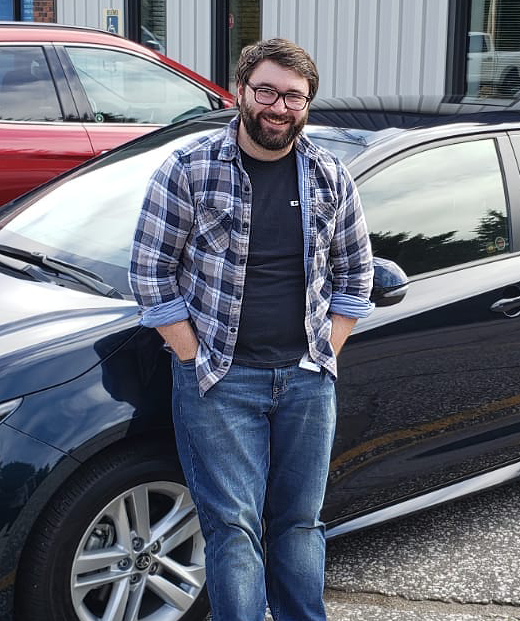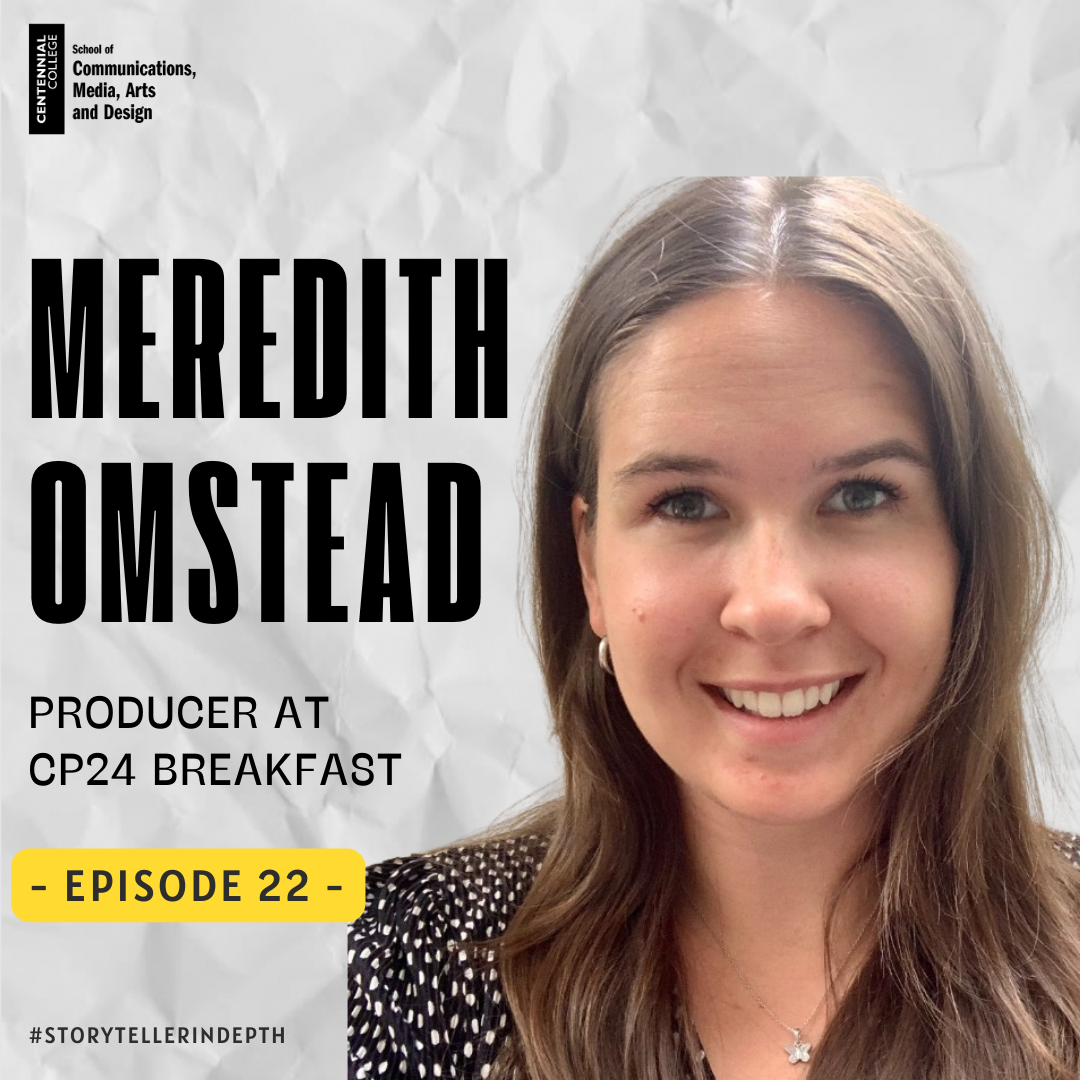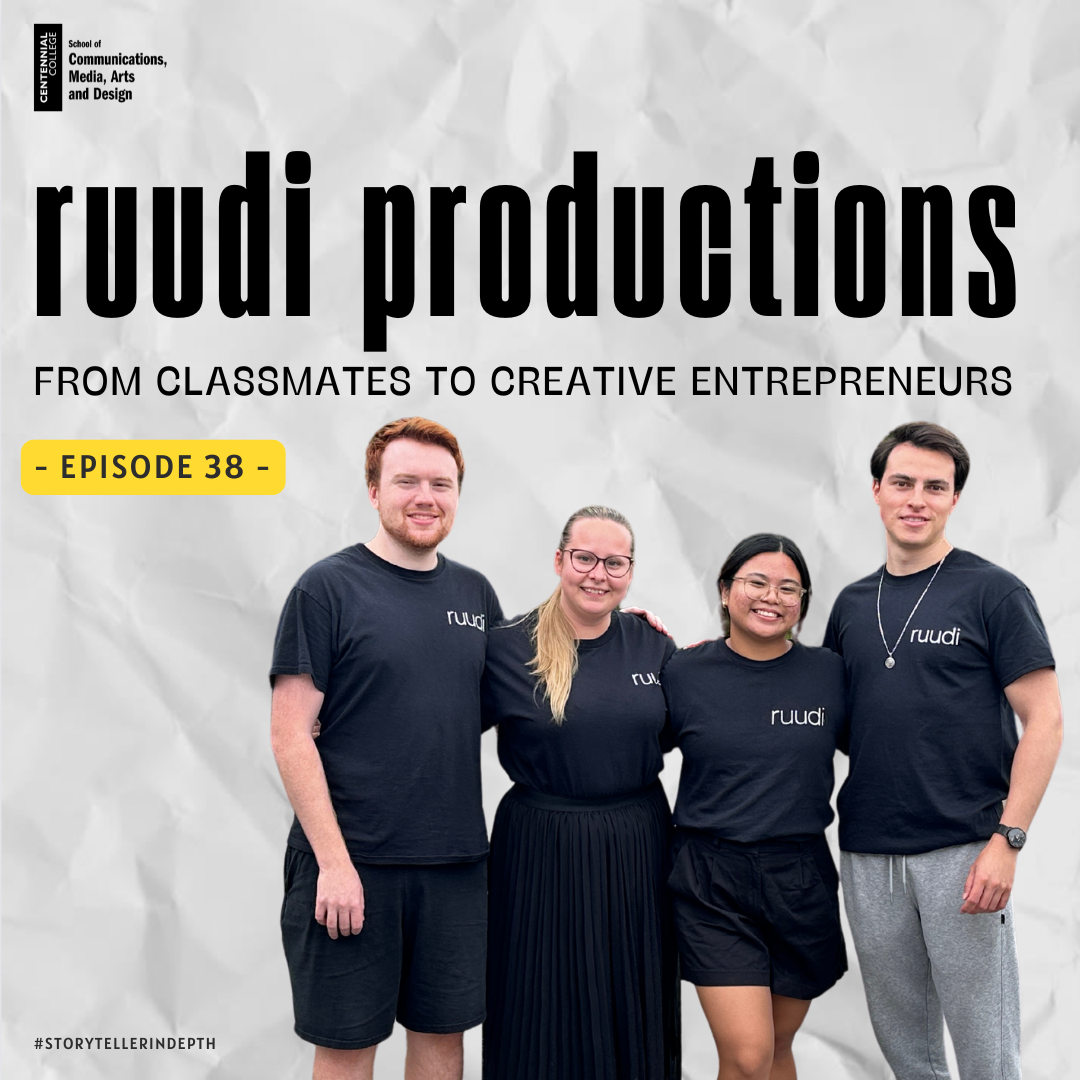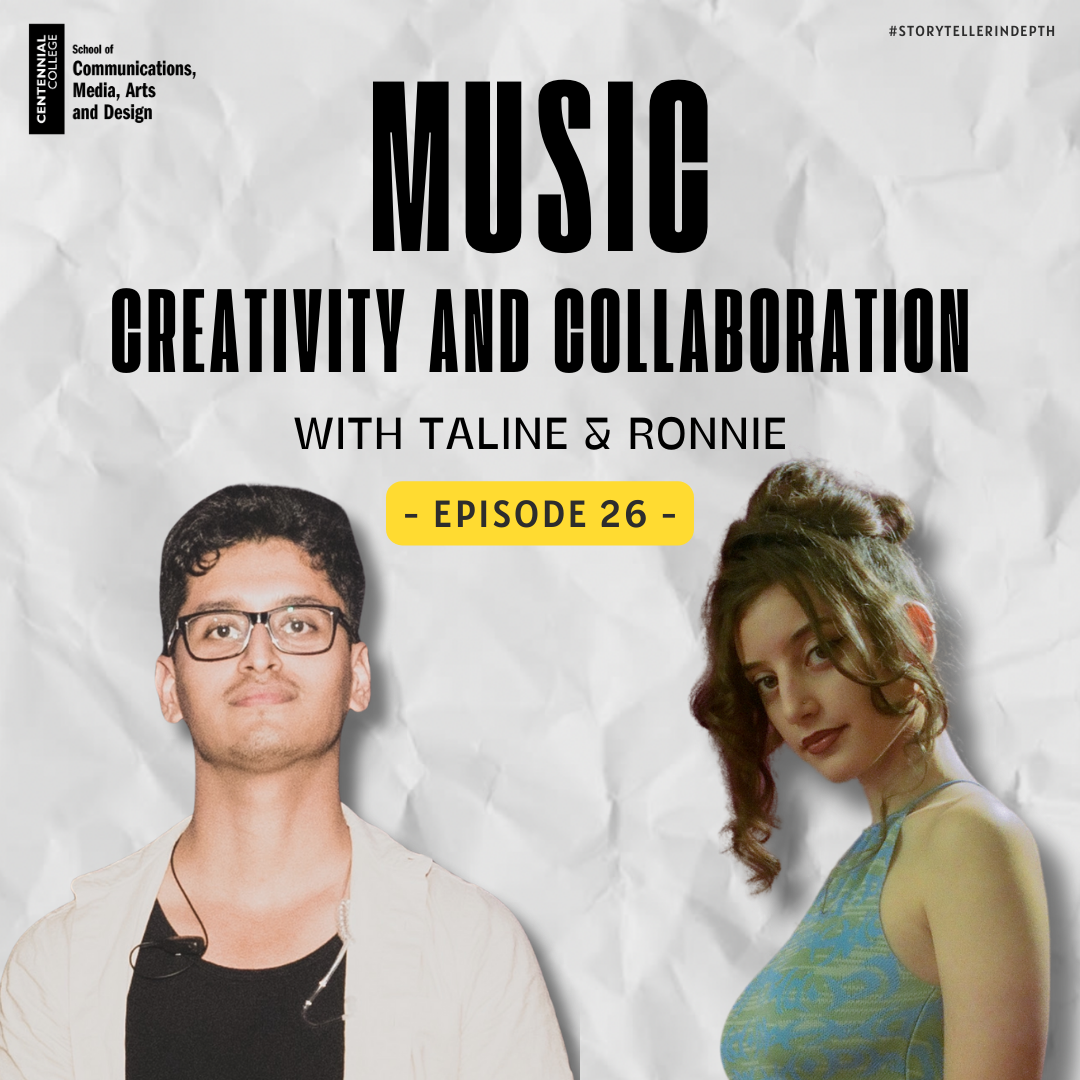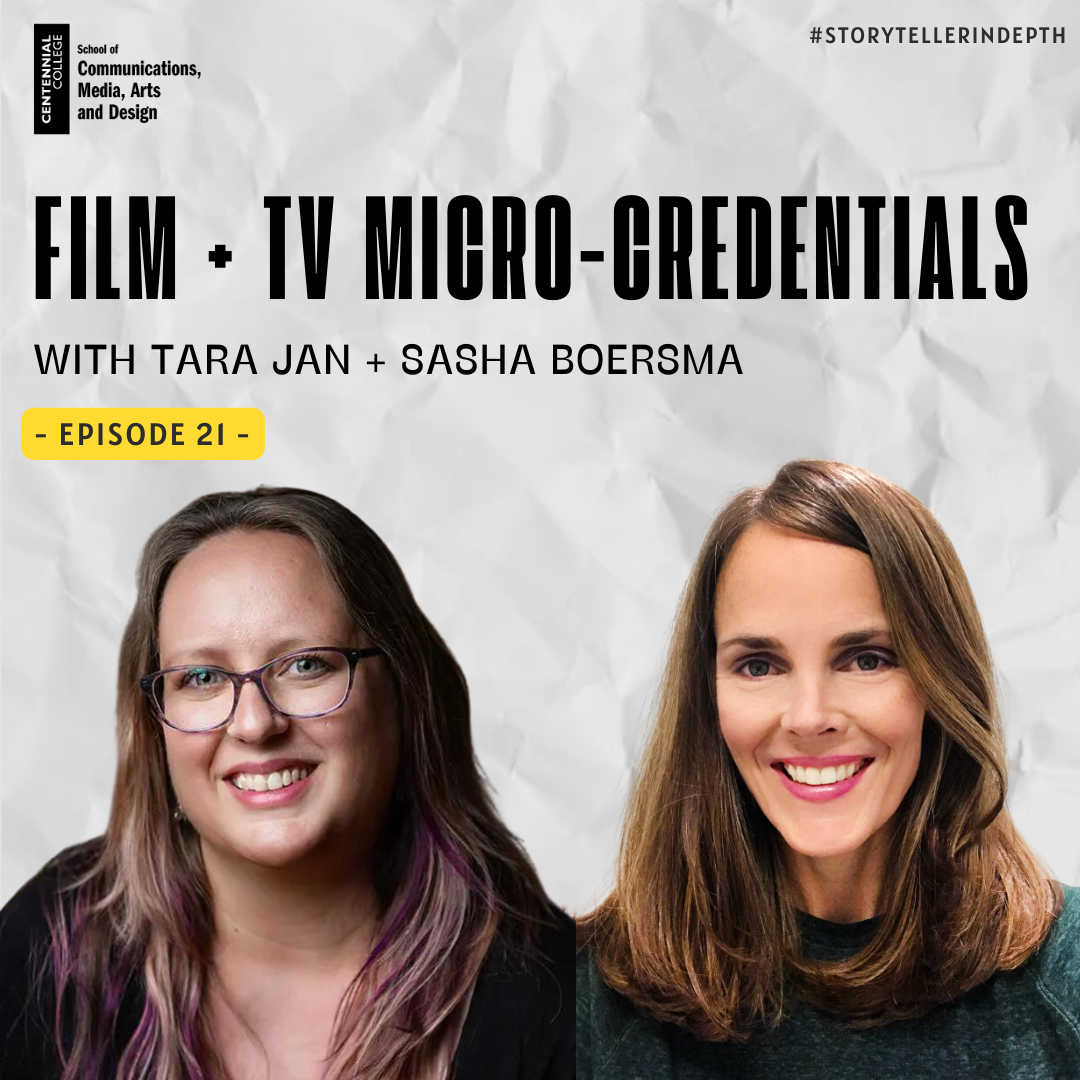Episode Transcript
[00:00:00] Speaker A: Hello, and welcome to Storyteller in depth, a podcast where we go behind the scenes to learn more about the school of communications media arts and designs, people, places, and things. I'm your host, Pat Quigley. Have you ever been watching live TV, like the news, for example, and wonder what's going on behind the scenes, like who put the show together? I know these questions run through my head, and to help answer them is Meredith Omsted, a producer at CP 24 breakfast. After Meredith graduated from our contemporary journalism program, she went on to complete Bell Media's graduate leadership program, where she worked on several shows under the Bell Media umbrella. And it has now led her to this exciting producer role that you're going to hear more about. Meredith has lots of great insights to share, so let's get into it.
[00:00:50] Speaker B: Thank you so much, Meredith, for being on the podcast today.
[00:00:52] Speaker C: Thank you so much for having me. I'm really excited to be here.
[00:00:55] Speaker B: Yeah, it's going to be a really fun conversation and talking about media and storytelling, which have been central themes to your career thus far. From being a graduate of a contemporary journalism program, to them being a part of the Bell Media graduate Leadership program to now working as a producer at CP 24 Breakfast.
When did your interest in this industry start and how did you know you wanted to pursue a career in it?
[00:01:20] Speaker C: I was a pretty late bloomer in terms of realizing that I wanted to be a journalist in school. I always gravitated towards math courses and business courses. And I originally started my undergrad in business, but then switched it to international development and global studies. And it wasn't until I graduated university that when I was thinking about what I wanted to do for my career that I was like, I kind of want to be able to tell the stories that I was learning about in school and my global studies degree. And I didn't really have the tools to tell those stories in a way that was employable. I only knew how to write essays for university. So I was talking to a few people and kind of just taking some time off after my undergrad to travel a bit. And when I was traveling, I was like, I think I want to be a journalist. And I looked into different programs, and the one at centennial stuck out to me because it really was focused on the future of journalism.
So that was kind of when I put all the pieces of what I had done together and applied to the program and crossed my fingers and hoped that it would work out and I would say it did.
[00:02:42] Speaker B: Cool. And you were part of the Bell media graduate leadership program. What exactly is that. And can you talk a little bit more about it?
[00:02:50] Speaker C: Yeah. So the Bell Media graduate Leadership program is a two year paid rotational program at Bell Media.
And during those two years, you do four rotations, and each rotation is six months long, and you just get to try out working on different teams. So Bell Media, for those who don't know, owns a lot of different media brands and properties, like TSN, CTV, CP 24, a lot of daytime shows like the social, Mary Berg's new show we own Crave. So there's lots of recognizable media brands that we run. And being in the Bell media leadership program, you get to work at a few of those different brands. So I worked on the Marilyn Dennis show when it existed, and I worked at Crave. I worked at CTV News channel, and I also got to try out advertising operations, which was something that I never would have tried. So it just kind of teaches you about the industry and how everything works together.
And at the end of those two years, you apply to a job internally and hope that you get it.
Everybody like you land in a full time role. And so the role that I landed in was as a producer at CP 24, but again, kind of similar to going to journalism school. When I started at the Bell media graduate leadership program, I didn't really know where I wanted to end up. So those two years helped me kind of figure out the path and network with people and ultimately end up where I am now.
[00:04:36] Speaker B: And was this part of your internship, or was this straight after you graduated or you finished a program at Centennial?
[00:04:45] Speaker C: My internship was something different. I actually applied to the Bell media grad leadership program out of my undergrad, and I didn't get in because, as I said at the beginning, I didn't really have those storytelling skills. And so at the time, they only took new grads for this Bell program every two years. And so the year that I graduated from Centennial was the off year, so I had to wait a year to start and apply. So my internship after Centennial was at the canadian press, and I got to be on their digital data desk there, which was run by Google, because I said that at the beginning, too, that I really used to like math. So I love data journalism, and that team was like the original chat GPT for journalists, and we got to use code and data to automate stories for journalists. So I worked there for a year, which was really interesting. Unfortunately, the Google funding ended and the team shut down.
But it was really innovative stuff and a really cool group of people to be surrounded by as my first job. So I think that experience, too, really helped me stand out when I was applying to the Bell media leadership program because it was a really unique thing that they were doing.
[00:06:04] Speaker B: And what a cool transition from doing the graduate leadership program to going to being a producer at CP 24 breakfast. So let's go back to your first day on the job. What did that look like, and how are you feeling?
[00:06:18] Speaker C: I was scared.
I was surprised that I started pretty late for all things considered on the first day of the role because now I start at 05:00 a.m. But the first day they asked me to come in for 10:00 a.m. So I was like, oh, wow, this is exciting. Maybe I'll be starting at ten.
But, yeah, I think starting any new job, you kind of feel a bit like an imposter sometimes and you're not sure, am I going to do well or how is this going to go? But the team immediately, when I met them, they're all so kind and welcoming, and it's kind of just been such a great environment to work in from the first day that I started.
Yeah, the first day you kind of just hit the ground running when you work at a newsroom because it's definitely leaner than most people would assume. Or maybe now after all the layoffs, people would assume that it's pretty lean, but you kind of take on so many roles. So first day you hit the ground running and are chasing guests and doing the job.
[00:07:34] Speaker B: Yeah. And I'm sure I don't know if there's anybody within Canada who doesn't know what CP 24 breakfast is or CP 24. I mean, it's in every coffee shop and every Tim Hortons, and people know it when they see it. So for yourself, can you share some of the responsibilities of your role and what the behind the camera work entails?
[00:07:54] Speaker C: So as a producer, it's very much working in a team environment to get the show on air.
I always explain in one sentence a producer in news, your job is to make sure that the anchors know what they're talking about and look good on camera from what they're talking about. Perspective. I don't do their makeup, but I do wear a lot of different hats in the newsroom. So I come up with segment ideas, whether that's different guests that we're interviewing or stories that we're talking about, or just like the games that we're playing on the show. I chase guests. I write scripts and questions for the anchors.
The main program we work in is called iNews, which we're getting into the nitty gritty, but I spend my whole day in there writing banners that you see on TV, getting the different photos and videos. And then I'm the only producer at CP 24 that produces the show from the floor. The rest of the other two producers on the team, they're in the control room during the show. So I'm like right off camera making sure that things are printed for the anchors and getting guests and bringing people up set design. So there's so many different things that go into it.
[00:09:26] Speaker B: It's obviously definitely not like, sorry to back up for a second. There's so many people who are like, oh, what does the job entail? And what is your day to day like? Is it different every day for you? Or is it like you have kind of the common themes but breaking news could happen at any time.
[00:09:48] Speaker C: Every day is pretty much set up the same, but the stories that we're covering obviously are different. And yeah, breaking news could happen anytime.
If there is a breaking news situation, I wouldn't be the one writing the copy for the breaking news. I would be the one trying to find guests to come on to talk about the breaking news.
But the day is structured pretty much the same. Like, I start at 05:00 a.m. And I am sitting on the floor, well, not usually sitting, running around until the show ends at 930. And then after that we have our hour production meeting which we talk about the show for the next day and then starting at eleven until like one. Every day I'm just lining up the show for the next day, writing the scripts and rinse and repeat for the week. And we work Monday to Friday. We don't have a weekend show. So I have a pretty unique role in the newsroom in the sense that I have set hours and I work Monday to Friday. So that's kind of nice.
[00:10:53] Speaker B: What is something someone at home watching CP 24 breakfast, for example, might not realize or be surprised to know about being a producer or from what is like a pretty fast paced set.
[00:11:05] Speaker C: I think what they'd be surprised to learn is that our team only has a few people on it.
We have two producers, so me and another producer, a senior producer, and our two anchors, and then our director. So there's like a handful of people on the team. And so because that you have to do as a producer, you have to do a lot of things that you might not think you'd have to do. Like we don't have a floor director, so I kind of direct on the floor sometimes. We don't have a set designer, so I'm the one who's setting up all the food. When we have food segments come in or fashion segments setting up the clothes, we have no runners to go get the guests, so I'm the one going to get the guests. From the front door, I serve the coffee to people, although our coffee isn't very good. So I tell them usually to just run across street to Starbucks. I get people water.
We have a segment every Tuesday where we have dogs come in called take me home Tuesday or other animals that need to be haunted because they're rescued animals. And a lot of the. There's just one spot. This is like, insider information. I don't know if I'm allowed to be saying this, but one spot in our boardroom where the dogs have seemed to mark their territory. And so I'm the one cleaning up that every week.
So I do a lot of different things.
I feel like sometimes I work in hospitality. In a lot of ways, it feels like that because I really have a people facing role.
[00:12:48] Speaker B: I'm sure when you got the job, they didn't tell you as duties as required, as cleaning up dog and animal messes on Tuesday afternoons.
[00:12:58] Speaker C: Tuesday mornings at 07:00 a.m..
[00:12:59] Speaker B: Morning. Sorry.
[00:13:00] Speaker C: Yeah, it's like first thing in the morning.
[00:13:05] Speaker B: Like waking up to a cup of that. Right?
[00:13:07] Speaker C: Yeah.
You really do everything, but it keeps it interesting. And I remember when I first started, I don't do it anymore because it kind of freaks me out. But I used to wear my apple Watch to work, and I would get 10,000 steps before 09:30 a.m.
And now I'm like, I'm not wearing that anymore because then I'm like, oh, my God, this is exhausting. And I almost make myself tired looking at it. But it's a very active job physically and mentally, which is fun because then you feel like you're actually accomplishing something every day and helping your team and informing audiences, and we have a lot of fun on the show.
[00:13:58] Speaker B: Do you have a favorite part? What's your favorite part about the role?
[00:14:01] Speaker C: I think all the people that I get to meet, they are just so inspiring, just getting to the honor to help other people tell their stories.
And obviously, it's fun to meet the celebrities, but I think the coolest people that we meet are just, like, people who are trying to do really awesome things with limited resources.
For example, I think the coolest person that I've met was this guy who is the youngest person trying to become the youngest person to do an iron man on every continent.
And he came on the show because he was training to do an iron man in Antarctica or the Arctic, somewhere really cold. And I was just, like, just hearing that he was just training in the ways that he was training and going into the lake, like frozen lakes and just swimming for hours and running in really cold temperatures, I was like, this is fascinating that humans just do these things, and it's really inspiring the limitlessness of humans. Yeah, it's really cool. So that's probably my favorite part about the role.
[00:15:41] Speaker B: That's awesome. Yeah.
I can only imagine the types and skill sets and just from people in general that come in on a daily, weekly, monthly basis. And then you probably have your standards of the people who come in all the time. But then when it gets down to some of the fun stuff, like tiff that's going on or anything else, you get to jazz up your morning a little bit in a different way.
[00:16:08] Speaker C: Yeah. And sometimes you forget when you're busy, you're running around, you forget the privilege that it is to be able to work in that environment and to meet these people. It's my job to, as I said, tell their stories or help them tell their stories.
I just think that that is such a privilege, and I definitely don't take that lightly. And even getting up at 04:00 a.m.
Just reminding myself, like, I get paid to do this, and it's just really cool.
[00:16:45] Speaker B: That's awesome. So there are several important skills to be an effective producer, but what are some of the personal skills or qualities about yourself that you've helped you rely upon on this role?
[00:16:56] Speaker C: I think attention to detail is the thing that I have to rely on the most. And I wouldn't say that I think that's sometimes a buzword that people use.
But when everything you do is seen by the public, you have to make sure you're not making mistakes. And so I think every human, or not every human, but a lot of humans have naturally pay attention to detail, like they care about their work. And I think I have that, too, but I've had to take it to the next level. Just knowing that somebody at the dentist office can be watching what we're doing. And I could write a word wrong on a banner, and then it just makes it look really unprofessional.
So it's like, really little things that matter and have more impact than just, like, I've worked in more business roles before and making a spelling mistake on a PowerPoint presentation. Yeah, that's unfortunate, but you're not going to get an email from an angry audience member.
So, yeah, attention to detail, but also kind of in the same vein, like, not dwelling on mistakes, because we make mistakes every day, like just being human.
And let's say you misspell a word at 05:30 a.m. When the show first starts. You can't let that affect the rest of the show. You just have to brush it off and move on. And people on the team are really understanding, and everybody makes mistakes sometimes, but just really not letting that affect you. And I think one of my early bosses in the newsroom said to me, it's okay to make a mistake once, but don't make it twice. Just learn from it. And don't spell that word wrong again or don't, I don't know, put the wrong image in again or get the wrong vis.
It's really important to learn from your mistakes and pay attention to detail for.
[00:19:10] Speaker B: Sure, especially when you've got to do it again the next day. Right. I'm sure on Fridays you get to relax a little bit.
[00:19:16] Speaker C: You're like, okay, yeah, Friday.
[00:19:18] Speaker B: I've got a whole weekend to get over it.
[00:19:19] Speaker C: Yeah. Especially because I finish work in the early afternoon. So that's nice, too, because then you're like, okay, I'm done. I can relax. But then I usually end up working on Sundays because.
[00:19:34] Speaker B: You got to get everything kind of disseminated from the weekend and probably have a pile on your desk Monday morning. Or like, okay, what was the news of the weekend?
Now try and produce through a whole Monday show.
[00:19:45] Speaker C: Yeah.
[00:19:47] Speaker B: So have you found that you've turned the skills and lessons from your contemporary journalism program into your career so far? Like, how has the program helped guide you to where you are today?
[00:20:01] Speaker C: Going into the contemporary journalism program, I don't think I ever thought that I would work in television, but the program taught me how to tell compelling, people centered stories that audiences really care about, and that has served me so well in this job. I hope to work in TV for a long time. You just never know where the industry is going. And it's no secret that TV isn't necessarily always people's first choice of medium when they're getting their news. But that doesn't mean that the stories that we tell aren't important and that the stories that how I'm learning how to tell stories and what I learned from the contemporary journalism program will apply to no matter what type of journalism I'm doing in the future, if I end up working in digital or radio or podcasting or no matter what. The way that you tell stories is all the same.
So the journalism program taught me, as somebody who had come from more like of an academic background, how to synthesize my thoughts and how to communicate them and how to make them interesting for the average person and not just for my university professors.
[00:21:31] Speaker B: Yeah, I don't want to say you just have to talk differently to the general public. Right. In an academic sense, almost said that wrong. In an academic sense. You've got to really kind of bring up the eyebrows a little bit to everybody so that you're saying the full sentences to things. But when it gets down to saying it to Nancy down somewhere in the east Village or something like that, you got to really make sure you're getting the information to her properly.
[00:22:01] Speaker C: Yeah, exactly.
And I think it also just like going off that Nancy sounds to me like person over 60, and unless people are naming their kids Nancy these days. And the program also taught me how to think about what audiences I am telling stories to.
A lot of the time. Our audience for CP 24 is mostly, we hope it to be younger, but a lot of the people are over a certain age or, like, in a certain demographic. And so just keeping that in mind, too, when we're telling stories or we're bringing certain people on. But then also, I think our audience class at centennial also taught me how to try to get new audiences in, so I think that was important, too.
[00:23:01] Speaker B: Yeah. And I'm sure we've talked about how fast paced and how much work kind of goes into the morning show and everything that you're doing. Right. And with the ever changing landscape that's going through media and going through the television industry. And definitely you're dealing with the higher percentage of the audience base and you're wanting to capture the younger. Right.
What do you have to do to make that happen? As a producer.
[00:23:35] Speaker C: I think there's a few things. The first, most immediate thing we can do is just bring on younger audience or, sorry, younger guests. Like, if you come on our show, for example, you would be telling your friends that you're coming on and they would watch, and then maybe they would turn it on a bit before and see something that they really like, and they're like, oh, this might be my new channel that I see. Like, I love the hosts or I love what they're talking about. So I think that's, like, an immediate easier thing to do. Tomorrow we have a few young entrepreneurs coming on the show to talk about how entrepreneurship is declining in Canada and what they're doing to revive it and different ways that they think that other people can kind of do that as well. And I think they're in their late 20s, early thirty s, and their companies that they have are really successful canadian startups. And so they'll be telling their friends and the people that are going to their event will know that they came on our show and then they go to their social media and they share it.
But then the other side of it, too is social media is such an important tool, and it's been tough to not be able to use Instagram and Facebook because they're blocked. And as I said, our team is really small, so we right now don't have really the capacity for me to be making TikToks all morning while working. So I think Belle's really invested in their digital strategy. So it will be interesting to see going forward how maybe we can utilize social media more. But, yeah, that news act has really affected us, too, for sure. Yeah.
[00:25:31] Speaker B: What advice do you have for someone who wishes to follow the similar career path as yourself? Or is there something you wish you had known before you kind of started out?
[00:25:42] Speaker C: I think don't be afraid to say yes to opportunities, no matter if you think they're actually going to lead you in the direction that you want to go or not. As I said, I started working with code and data, and now I'm a TV producer. But it was the connections that I made and just like the skills that I got along the way or working in advertising operations, those aren't things that you think are going to translate to this role. But my dad, he always says to me, good work leads to good work. And if you put your best foot forward in any job you do, and you really try to get to know the people around you and show up every day the best that you can, you never know where each role is going to lead you. So I remember when I started at Centennial, I went to Tim Doyle, who's the head of the contemporary journalism program. And I was Tim, like, I really want to work at the New York Times. And he was like, okay, I don't think your internship is going to be at the New York Times, but maybe one day you'll get there. And the point is, you might have this lofty goal, but don't. And I don't know if I want to work at the New York Times still. But the point is, you might look at me or somebody that you want that kind of job, and you just never know the little jobs that people had along the way.
So, yeah, I would definitely give that advice to people or remind myself that if I was starting out.
[00:27:18] Speaker B: Well, I think that's probably a beautiful note to end on, Meredith. So thank you so much for coming on and chatting today.
[00:27:24] Speaker C: Thanks, Pat. I really appreciate you having me. And it was great to chat.
[00:27:38] Speaker A: What a great conversation. It was so interesting to hear how Meredith works in a smaller team and what some of her responsibilities are. Working on a morning show seems like such a cool experience. So congratulations, Meredith, on this exciting role. Head over to our Instagram at Story Art center to let us know your thoughts on this episode. And until next, I'm your host, Pat Quigley, and this is storyteller in depth.
